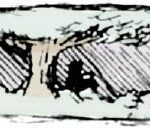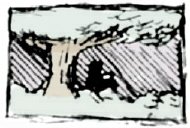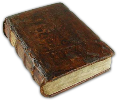
 A robin roosted in the cherry eaves
A robin roosted in the cherry eaves
atop the tower of Amalgam’s Hall,
and made its nest of bones and holly leaves,
securing it with mud against the wall.

 A robin roosted in the cherry eaves
A robin roosted in the cherry eaves
atop the tower of Amalgam’s Hall,
and made its nest of bones and holly leaves,
securing it with mud against the wall.
 Ever wonder why you’ve never received thirteen of anything for the price of a dozen at any bakery you’ve ever visited? Well, wonder no more, because there’s no point in worrying about it.
Ever wonder why you’ve never received thirteen of anything for the price of a dozen at any bakery you’ve ever visited? Well, wonder no more, because there’s no point in worrying about it.
And, while you’re getting over your disappointment, enjoy the follow “Baker’s Dozen” links on publishing and writing!
 glebe. The soil; cultivated land; especially, land assigned to a clergyman as part of his benefice… Gleby soil … is rich, fertile soil.
glebe. The soil; cultivated land; especially, land assigned to a clergyman as part of his benefice… Gleby soil … is rich, fertile soil.
– Dictionary of Early English by Joseph T. Shipley (1955).

 A blanket-weaver from the eastern hills
A blanket-weaver from the eastern hills
sold forty quilts for three Amalgam jacks:
He did not charge an extra for the frills,
but dropped the price by one to counter tax.

 I could literally fill one of my typical publishing links entries with “end of year stats” from various agents, and I encourage writers to go out into the agentosphere looking for them, because their variety provides some real insight into the diversity of the literary representation biz.
I could literally fill one of my typical publishing links entries with “end of year stats” from various agents, and I encourage writers to go out into the agentosphere looking for them, because their variety provides some real insight into the diversity of the literary representation biz.
But no, I will not roll out a runner of stat links. Instead, I offer a list of recent writing and publishing links that seem curiously bound by the themes of fear, death, and the macabre, perhaps more appropriate for this dark time of year than it might seem.
 New Year’s gifts The giving of presents at this time was a custom among both the Greeks and the Romans, the latter calling them strenæ… Nonius Marcellus says that Tatius, king of the Sabines, was presented with some branches of trees cut from the forest sacred to the goddess Strenia on New Year’s Day… Magistrates were formerly bribed with gifts on New Year’s Day, a custom abolished by law in 1290.
New Year’s gifts The giving of presents at this time was a custom among both the Greeks and the Romans, the latter calling them strenæ… Nonius Marcellus says that Tatius, king of the Sabines, was presented with some branches of trees cut from the forest sacred to the goddess Strenia on New Year’s Day… Magistrates were formerly bribed with gifts on New Year’s Day, a custom abolished by law in 1290.
– Brewer’s Dictionary of Phrase & Fable, Sixteenth Edition revised by Adrian Room.